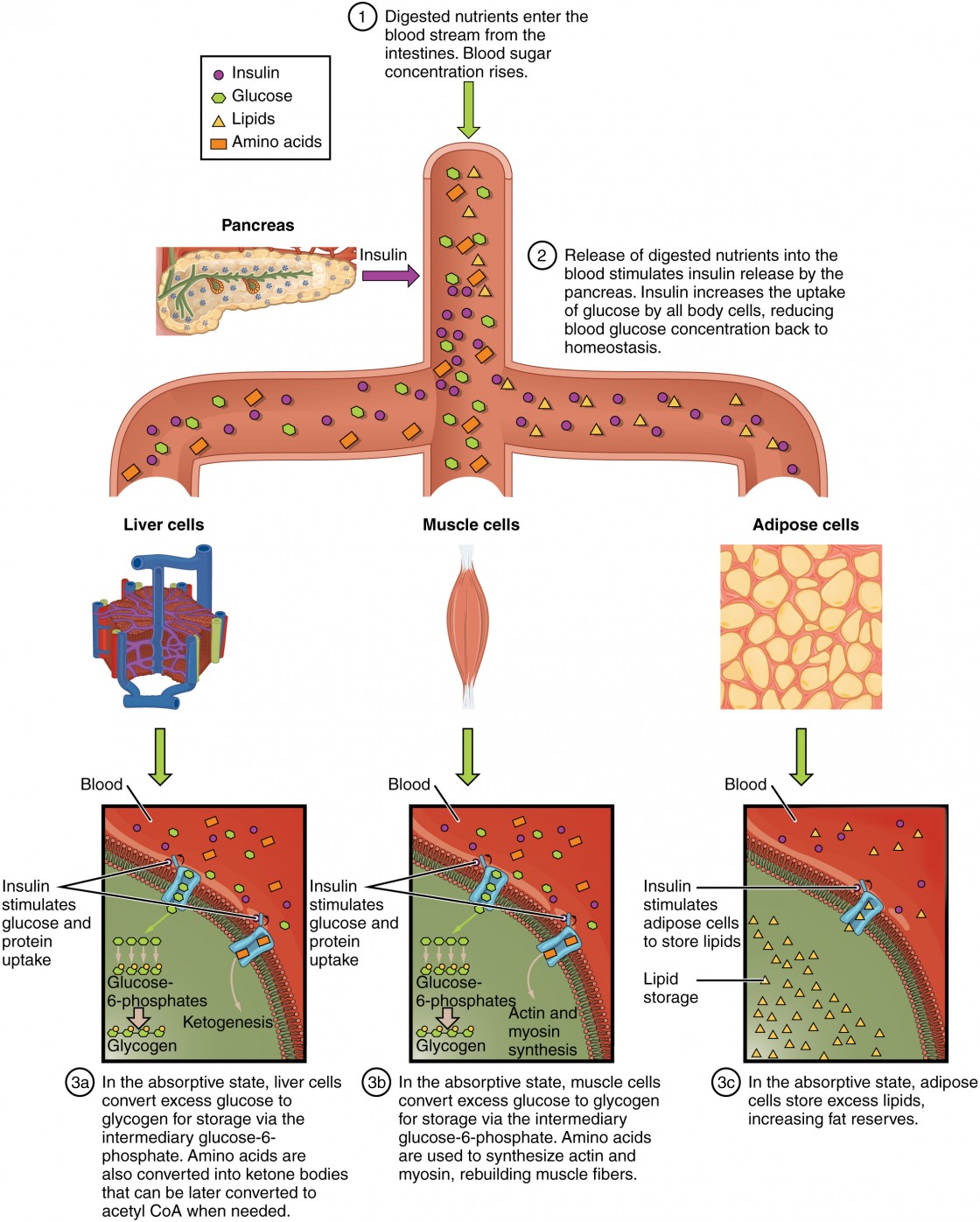When the body detects increased levels of glucose or amino acids in the small intestine beta cells in the pancreas secrete a hormone called insulin that promotes the absorption of glucose by cells in the body. Excess dietary fat is also stored as triglycerides in adipose tissues.

Metabolism Energy Needed For All Physical Metabolic Activities Food Principle Source Of Energy Digested Absorbed Supplies Energy Serves As Building Ppt Download
Glucose is also commonly known as sugar a part of more complex carbohydrates.

Excess glucose is stored as. Glycogen Animals including humans store some glucose in the cells so that it is available for quick shots of energy. Glucose that is not needed for energy is stored in the form of glycogen as a source of potential energy readily available when needed. When glucose consumption is in excess of body needs and glycogen stores are full the excess glucose is _____.
Excess glucose is stored as glycogen or stored glucose in the liver and the muscles. Excess glucose will be stored in your liver as starch. When blood sugar rises in the blood insulin sends a signal to the liver muscles and other cells to store the excess glucose.
When the production of glucose exceeds what the body needs it is stored as or used to synthesize fats. Click to view a larger image. The unused sugar is transported through the phloem stored in the trunk or roots as starch and then turned back into sugar to be used as energy again at the start of a new spring.
This causes glucose to move from the blood into the cells where the excess glucose is stored. Excess glucose is stored in the liver as the large compound called glycogen. Excess glucose is stored as glycogen in animals and humans while it is starch when found in plants.
Some is stored as body. Some is stored as body fat and other is stored as glycogen in the. Glycogen is a polysaccharide of glucose but its structure allows it to pack compactly so more of it can be stored in cells for later use.
Your body can store enough to fuel you for about a day. After the release of insulin which of the following events will not occur. Glucose can be converted into a larger molecule called glycogen that is typically stored in the liver and muscles.
And this is important because when your glucose level in your blood is low that glycogen can be broken back into glucose I A hormone called Luca. The human body has several mechanisms to store or eliminate excess glucose from the blood. If the blood glucose concentration is too high the pancreas produces insulin.
Glycogen serves as a backup fuel source when blood glucose levels drop. As a source of fuel glucose is abundant in foods rich in carbohydrates and starch like bread pasta potatoes and sweets. Trees are known to create sugar through photosynthesis.
Excess glucose will be stored in your muscles as glycogen. Glycogen plays an important role in homeostasis because it helps our body function du Continue reading Worlds first diabetes app will be able to check glucose levels without drawing a drop of blood and will be able to reveal what a can of coke REALLY does to sugar levels. If not the excess glucose is stored as glycogen in the liver and muscle cells or as fat in adipose tissue.
Figure 1 summarizes the metabolic processes occurring in the body during the absorptive state. Excess glucose will be stored in your fat cells as fat. View chapter Purchase book.
Click to see full answer. When these and other body cells are saturated with glycogen excess glucose is converted to fat and is stored as adipose tissue. Despite the fact that eating a jelly doughnut seems to deposit fat directly on your hips converting sugar to fat is actually a relatively complex chemical process.
Converted to fat and stored in fat cells Fatty acids enter the metabolic pathway as an __________ molecule. If the body already has enough energy to support its functions the excess glucose is stored as glycogen the majority of which is stored in the muscle and liver. After your body has used the energy it needs the leftover glucose is stored in little bundles called glycogen in the liver and muscles.
Sugar conversion to fat storage depends not only upon the type of foods you eat but how much energy your body needs at the time you eat it. Most glycogen is stored in the liver and in muscle cells. If your body has more glucose than it needs that excess glucose is stored as glycogen in your liver and muscles or as triglycerides in your fat cells.
Glickman holds about 50000 molecules of glucose so its a pretty easy way to store glucose and that glycogen can be stored in the liver as well as the muscles. When the body needs glucose glycogen is broken down to provide an energy source. Inside of the plant excess sugar is stored as starch.
Unused glucose is converted to glycogen by a chemical process called glycogenesis and is stored in muscle tissues and your liver. As you body breaks down carbohydrates into glucose it delivers it to your bloodstream to supply your bodys cells with fuel for energy.